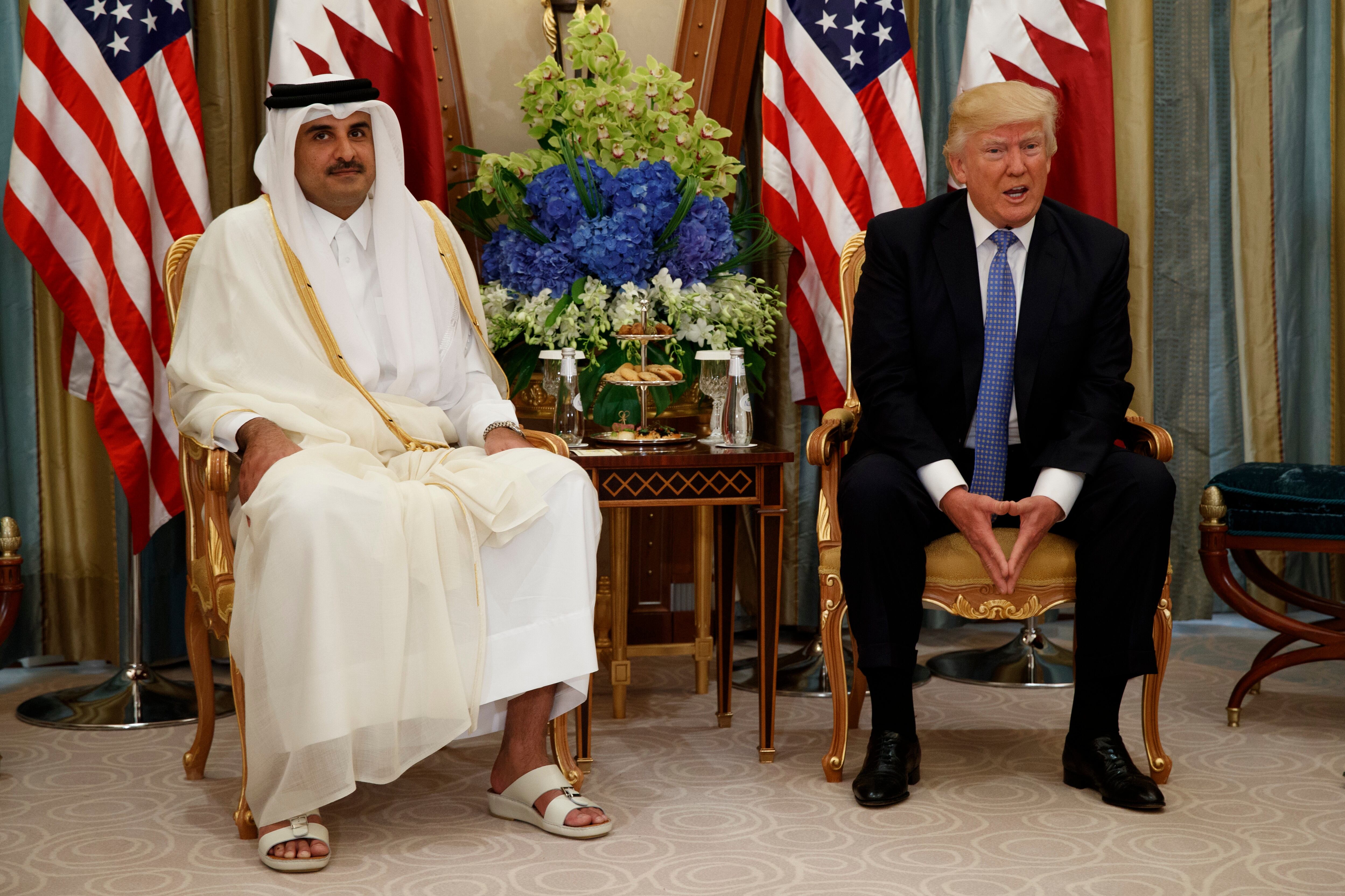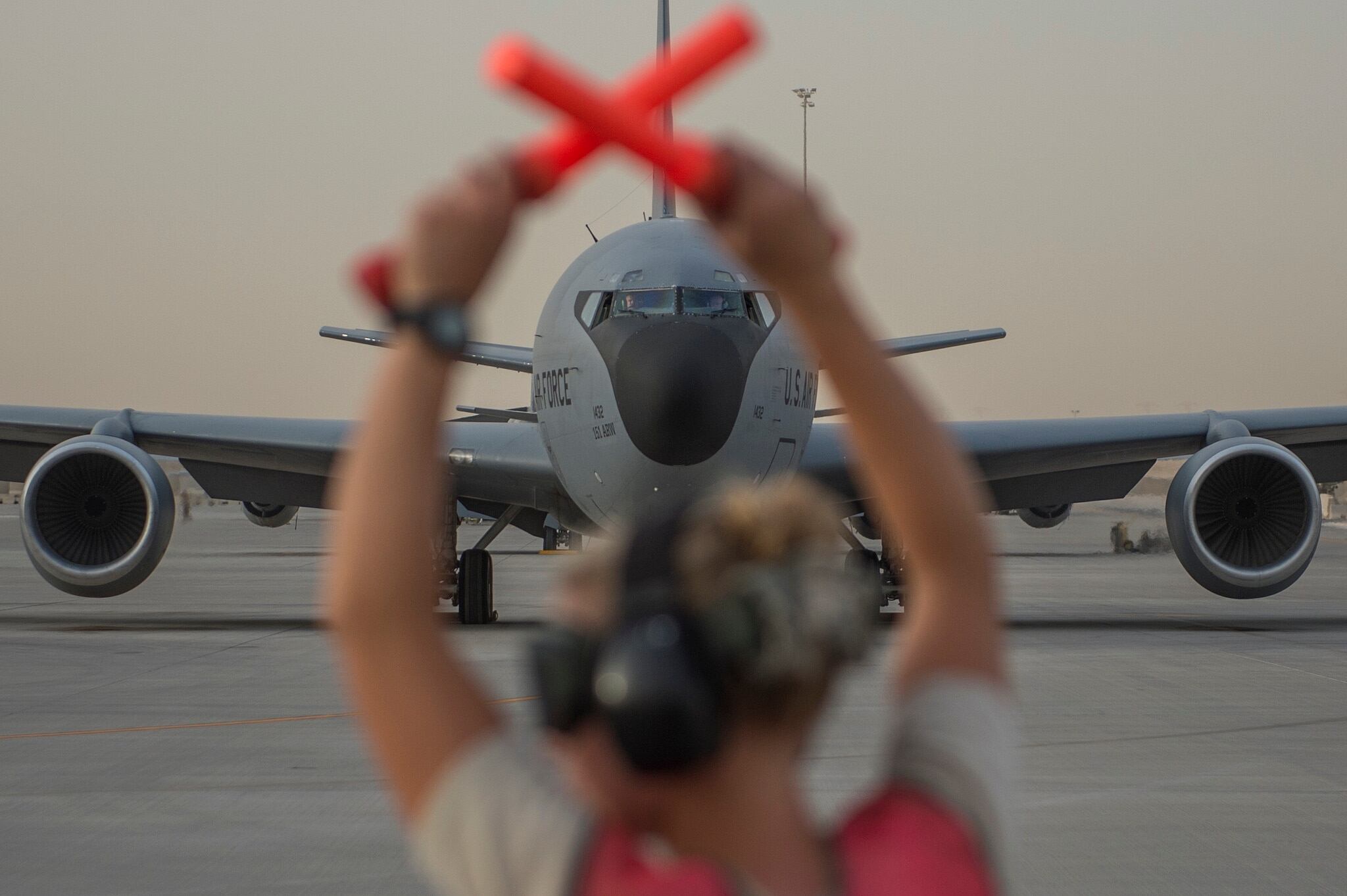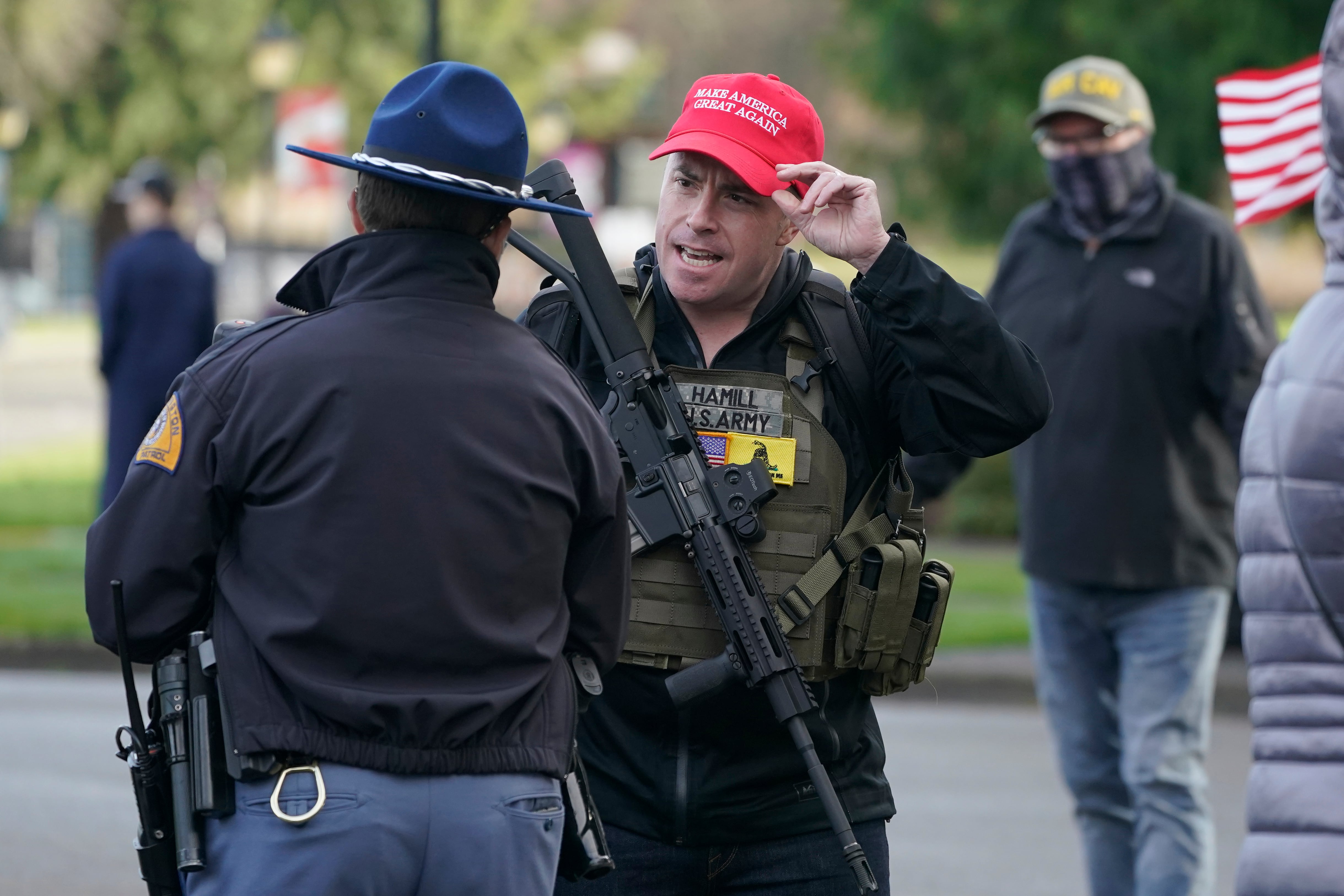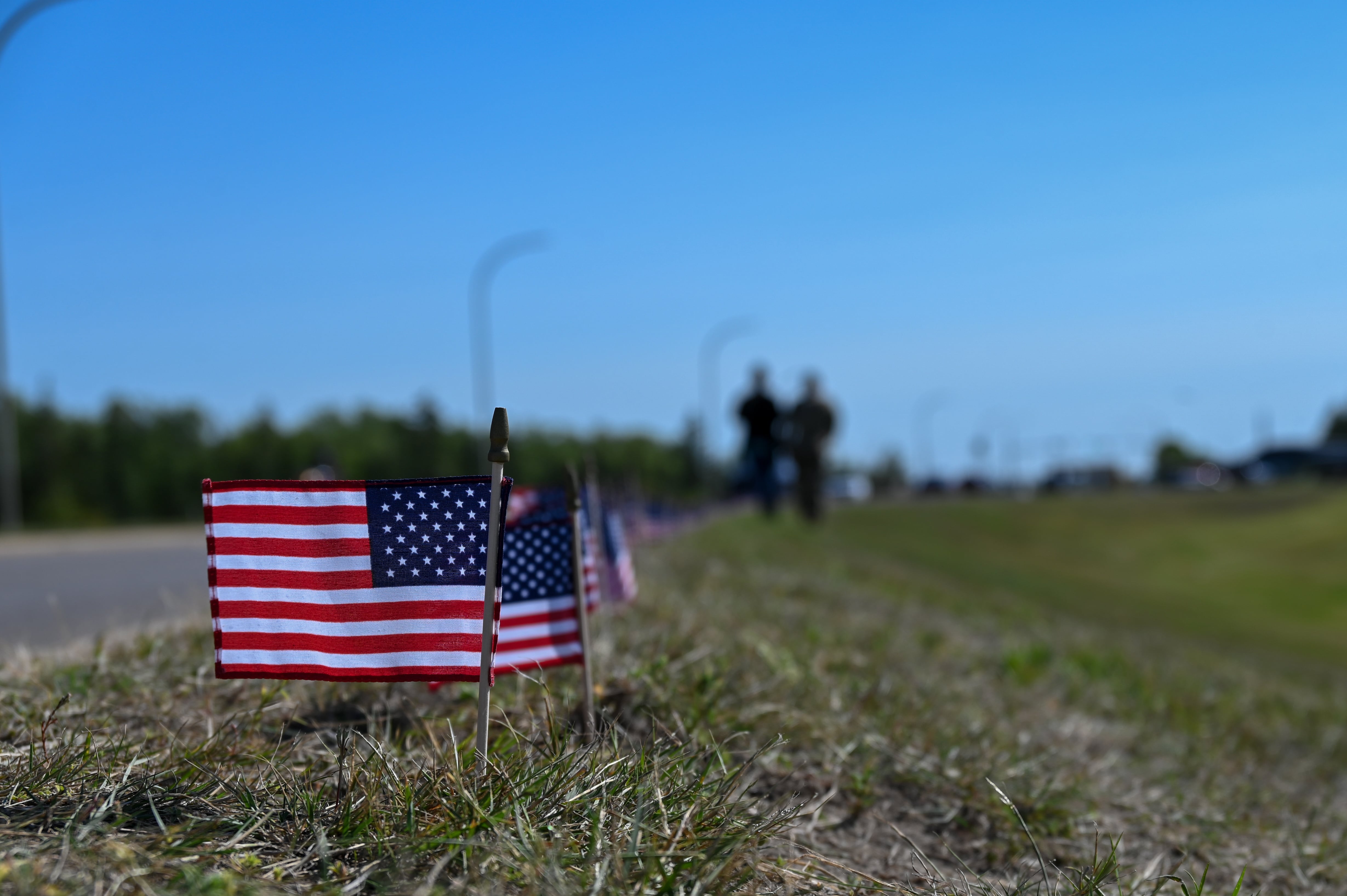President Trump took to Twitter Tuesday morning and attacked a country that hosts the beating heart of his quest to crush the Islamic State militant group in Iraq and Syria, leaving national security experts stunned and wondering what impact his words would have on the U.S. military's presence in the Middle East.
In the wake of a massive rift in relations between Qatar and its neighbors, Trump took to Twitter and strongly implied that Qatar was funding Islamist extremists and seemed to take credit for Saudi Arabia, Bahrain, Egypt and the United Arab Emirates all breaking off diplomatic relations with Doha on Monday. The nations claimed to take the action because Qatar was funding the Muslim Brotherhood and the Islamic State. Libya, Yemen and Maldives have all since joined the Gulf states.
"During my recent trip to the Middle East I stated that there can no longer be funding of Radical Ideology," Trump tweeted. "Leaders pointed to Qatar — look!"
He later tweeted that it was, "So good to see the Saudi Arabia visit with the King and 50 countries already paying off. They said they would take a hard line on funding extremism, and all reference was pointing to Qatar. Perhaps this will be the beginning of the end to the horror of terrorism!"
The comments from the president immediately raised the stakes for a major U.S. hub in the region at Al-Udeid Air Base, a central part of the U.S. air war in Iraq and Syria, and which houses 10,000 American troops and aircraft such as B-52 Stratofortresses, C-130 Hercules, KC-135 Stratotankers and E-8 JSTARS. Some worried that his taking sides could precipitate a break with Qatar and leave the U.S. looking for a new place to run the war from in a region mired in tensions.
It is hard to overstate how crucial Al-Udeid is to the coalition's war against the Islamic State. It is the home of U.S. Central Command's forward headquarters, as well as the Combined Air Operations Center, which the Air Force has repeatedly called the "nerve center" of the air campaigns it wages in the Middle East. The CAOC provides command and control of U.S. and allied nations' air power over 20 nations there, including Iraq, Syria and Afghanistan.
Many national security experts were shocked that Trump would weigh in on the rift, especially since only the day before Secretary of State Rex Tillerson had called on all sides to resolve the feud peacefully.
In an email, Peter Singer, an analyst with the New America Foundation, blasted Trump’s decision to weigh in on the Qatar rift.
"Like so much of what Trump does on Twitter, it was unthinking and unneeded," Singer said. "There was literally no national security gain or strategic value in that tweet. A few seconds of popping off online just created another mess for the adults in his administration to try to clean up."
Others defended the president's tweets, saying Qatar needs to be called out on its activities which have for years, at times, run counter to U.S. interests.
James Carafano, a retired Army lieutenant colonel and national security analyst at the Heritage Foundation, defended Trump’s Twitter rant, pointing to many areas — including its support of the Muslim Brotherhood — where Qatar’s policies undermine U.S. interests.
"Do people want him to defend Qatari foreign policy?" Carafano said. "We know Qatar runs an independent foreign policy, and some of that supports some folks who are not good people. That’s a problem. Why in God’s name would people be critical of the president for this? Qatar is in need of some tough love."
If Trump’s criticisms threatened the U.S. military’s airbase at Al-Udeid, it’s worth it to make the point about Qatar’s support of extremism, Carafano said. Ultimately, Carafano argues, breaking the cycle of supporting groups who threaten U.S. interests is the important thing.
"We have a huge Navy presence in Bahrain," he said. "And if we didn’t have Bahrain, we’d need three more aircraft carriers to make up for it. Qatar is funding the Muslim Brotherhood, which has been trying to undermine the government of Bahrain, so which base is more important? Quite honestly, I think it's worth the risk, and if Qatar tells us to leave the base tomorrow, the United Arab Emirates would probably build us a new base the next day."

In this May 21, 2017, file photo, U.S. President Donald Trump, right, holds a bilateral meeting with Qatar's Emir Sheikh Tamim Bin Hamad Al-Thani, in Riyadh, Saudi Arabia. On Monday, June 5, 2017, Bahrain, Egypt, Saudi Arabia and the United Arab Emirates cut diplomatic ties to Qatar, further deepening a rift between Gulf Arab nations over that country's support for Islamist groups. The crisis comes after Trump's recent visit to Saudi Arabia for a summit with Arab leaders.
Photo Credit: Evan Vucci/AP
Long simmering tensions
Qatar’s foreign policy has long vexed the United States and its Sunni allies in the region, including Saudi Arabia, Bahrain and Egypt. It has also refused to fully cut ties with the Iranian regime, which angers Iran’s arch-rival Saudi Arabia.
It has for years been accused of funding the Muslim Brotherhood and giving support to its activities in the region. It has also maintained relations with Shia militant group Hezbollah, which is backed by Iran, and Sunni militant group Hamas.
Jeffrey Martini, a senior Middle East analyst at the RAND Corporation, said there is certainly reason to criticize Qatar, but since the Saudi-led coalition of Arab nations is likely to come out on top of this dispute no matter what, Martini said, it doesn’t gain the U.S. anything to take sides.
"The Saudis and the Emiratis, the Bahrainis, the Egyptians, they’re going to prevail, and I don’t think the U.S. needs to add further weight to this," Martini said. "It’s really unwise to weigh in on this intra-GCC [Gulf Cooperation Council] rift and take sides."
Martini pointed to Defense Secretary Jim Mattis’ remarks in Australia emphasizing that coalition operations will not be disrupted by the dispute, and said that is probably correct. Even if Qatar’s leaders are miffed by Trump’s comments, Martini said, they know the U.S. military presence there provides considerable security benefits to them.
"They see the U.S. not only as a tripwire for foreign aggression from say, Iran, or another state across the Gulf, but it also plusses them up in relationship with these larger GCC states," Martini said. "They don’t want to be junior partner to the Saudis or the Emiratis, who are much larger and stronger. So having the U.S. footprint there balances them out a bit. There are lots of reasons why they’d want the U.S. air base there."
Since the CAOC was moved to Qatar 14 years ago, around the time the Iraq War began, the two nations have built deep relationships, he said. But the fact that the U.S. had to move the CAOC from Saudi Arabia to Qatar at that time underlines the delicate politics of the American military presence in the region — and shows why finding another home for the CAOC, if it came to that, might not be particularly easy.
Because of "Saudi domestic resentment [of the Iraq War], we had to relocate to Qatar," Martini said. "So for anyone who’s thinking, 'well, let’s punish the Qataris and move the CAOC someplace else,' we ended up in Qatar because they were more amenable to hosting U.S. forces than this state, Saudi Arabia, that’s pursuing punitive action against the Qataris. So we have to be measured in our policy responses here."

Senior Airman Clarissa Banks, a 340th Aircraft Maintenance Unit crew chief, controls the movement of a KC-135 Stratotanker prior to takeoff on Al Udeid Air Base, Qatar, April 8, 2015.
Photo Credit: Senior Airman James Richardson/Air Force
Inflaming Sunni/Shia tensions?
Others see the President’s tweets as continuing to drive a wedge between predominantly Shia and predominantly Sunni nations, and that, ultimately, it’s in the best interests of the United States to strike a balance between supporting Sunni allies while not alienating Shia populations. That makes Trump's taking credit for the rift with Qatar — a predominantly Sunni nation with ties to Shia Iran — particularly unhelpful, said a former Obama administration official who spoke on background.
While there is no denying that the Qatari regime has supported groups that undermine U.S. policy, the U.S. position in the Middle East has always been a delicate balancing act, the official said.
Trump's speech in Saudi Arabia in May called on Muslim nations to unite against extremism and labeled Iran as a major obstacle to peace, saying the country "has fueled the fires of sectarian conflict and terror."
Many saw Trump's speech as taking sides in the continuing Sunni/Shia sectarian tensions engulfing parts of the Middle East. That speech and Trump's call for action may have given Saudi Arabia a pretext to go ahead with its break from Qatar, which it sees as too chummy with Iran.
"Qatar does support people who are inimical to our interest in the region, and the president’s overall message of unifying against extremism is still valid," the official said. "But what I think you are seeing in this Qatar rift is that he’s kind of put his thumb on the scale in the Sunni/Shia divide, and that’s not good either. That’s why both Republican and Democrat administrations have tried to take a more balanced approach to Qatar and its role in the region."
Tillerson’s comments Monday, which called for all sides to sit down and work out their differences, were encouraging and a good way to "take the temperature down a bit," the official said.
Tillerson told reporters that the tensions had been rising between Qatar and its neighbors for some time.
"I think what we're witnessing is a growing list of disbelief in the countries for some time, and they've bubbled up to take action in order to have those differences addressed," he said.
The rift between the Gulf States and Qatar hasn't impacted operations at Al-Udeid yet, Air Force leaders said Monday.
Air Force Secretary Heather Wilson and Air Force Chief of Staff Gen. Dave Goldfein said Monday and Tuesday that operations at Al-Udeid are unaffected by the diplomatic rift.
However, Goldfein also suggested the Air Force has a backup plan, telling lawmakers in a hearing Tuesday morning that, "we always build alternative contingencies to be able to continue operations."
David B. Larter was the naval warfare reporter for Defense News.
Stephen Losey is the air warfare reporter for Defense News. He previously covered leadership and personnel issues at Air Force Times, and the Pentagon, special operations and air warfare at Military.com. He has traveled to the Middle East to cover U.S. Air Force operations.





